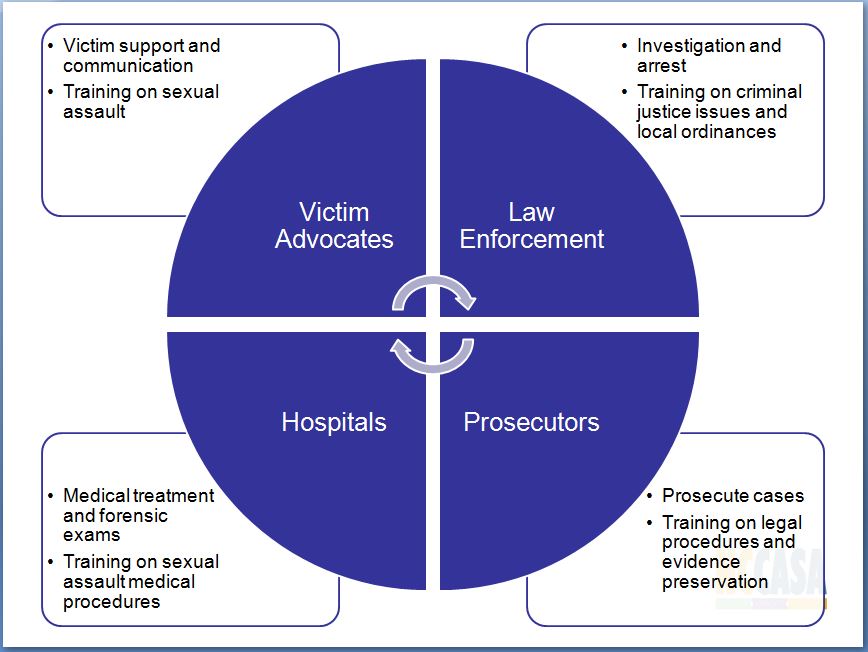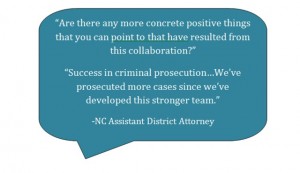Currently in the United States, one in five women and one in 71 men have been raped at some time in their lives. [1] However, arrest, prosecution, and conviction rates remain extremely low for these crimes. This is not only an issue of justice for individual cases. The majority of sexual assault perpetrators are serial offenders, and they are likely to continue to perpetrate violence in our communities if they are not held accountable for their crimes.
Sexual Assault Response Teams (SARTs) are multidisciplinary teams of professionals who partner together to provide inter-agency, coordinated responses to sexual assault in order to: 1) meet the needs of victims/survivors, and 2) more effectively hold offenders accountable.
One of the primary functions of SARTs is to streamline and coordinate the criminal justice response to sexual assault in a community. In keeping with that goal, there are core disciplines that are especially important to include on a team. The coordination of services provided by these disciplines can have a significant impact on the immediate experience of a victim seeking help and the careful, thorough collection of evidence to build the strongest case possible.
What do SARTs do?
- Internal information-sharing and training
- Community awareness about resources available and community commitment to victims/survivors of sexual assault
- CCR/SART response protocols
- Case review (not all SARTs conduct case reviews)
Do SARTs Work to Improve Criminal Justice Outcomes?
Cases involving Sexual Assault Response Teams [2]:
- Are reported more quickly.
- Yield more evidence.
- Are more likely to lead to arrest.
- Are the strongest predictor that charges will be filed.
- Keep victims better informed and engaged throughout the criminal justice process.
Developing a SART in your community
In collaboration with the NC Coalition Against Domestic Violence, NCCASA has developed the following toolkits to guide North Carolina communities that are interested in increasing their collaboration across disciplines to more effectively respond to sexual and/or domestic violence.
The following additional resources are available to NCCASA members:
- Bi-monthly NC SART Coordinator Conference Calls
- NC SART Coordinator listserve
- In-depth technical assistance for communities developing or strengthening SARTs
If you are interested in accessing any of these resources, please contact Charnessa Ridley at [email protected].
[1] Black, M.C., Basile, K.C., Breiding, M.J., Smith, S.G., Walters, M.L., Merrick, M.T., Chen, J., & Stevens, M.R. (2011). The National Intimate Partner and Sexual Violence Survey (NISVS): 2010 Summary Report. Atlanta, GA: National Center for Injury Prevention and Control, Centers for Disease Control and Prevention.
[2] Nugent-Borakove, M. E., Fanflik, P., Troutman, D., Johnson, N., Burgess, A., & O’Connor, A.L. (2006). Testing the Efficacy of SANE/SART Programs: Do They Make a Difference in Sexual Assault Arrest & Prosecution Outcomes?


